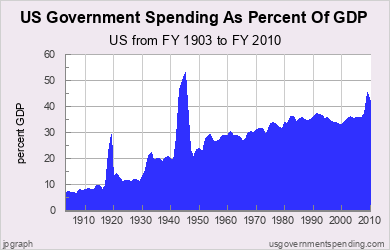Everyone, myself included, spends way too much time arguing about the optimal public policy and far too little time arguing about how to actually implement it. Robert Higgs at the Beacon wrote a piece a week ago explaining that, while he's excellent at explaining why the government is growing,
he doesn't have a clue how to do anything about it (this is a common question asked to people who offer a devastating critique of the way things are). He received lots of pushback, so he wrote another post today explaining
why reducing the size of government is such a difficult problem:
If one chooses the direct political option, where does one get the financing for it? Who will organize it? Who will lead it? What actions will it take? Will it try to place sympathetic candidates on the ballot for election to Congress? Will it attempt to influence sitting members of Congress by bribing them with campaign contributions or by threatening to recruit constituents to vote against them in the next election? My point is that once we select a specific means of stopping or slowing the government’s growth, an endless series of follow-up questions presents itself, as we encounter one problem after another, each of which must be solved successfully if we are to make headway.
No doubt the greatest obstacle of all to any such effort is that thousands of organizations are currently working, directly or indirectly, to promote further growth of government. A 2005 article in the Washington Post placed the number of registered lobbyists in Washington, D.C., at more than 34,750 and reported that their business was booming, creating “a gold rush on K Street.” Many of them have well-equipped offices, large capable staffs, including legions of lawyers, and established connections with incumbents in Congress, regulatory agencies, and other government offices, not to mention their friends on the courts. They also have millions upon millions of dollars to pour into their efforts to win friends and influence people, including the same mass electorate that an anti-Fed or other anti-government-growth political movement presumably seeks to influence. At this point in the historical process, anti-Fed proponents face a fabulously wealthy, tightly connected, deeply entrenched conglomeration of opponents who would sooner confine you, me, and all our friends and relatives at Guantanamo for nonstop torture than give up the Fed, which has long served, and continues to serve, their interests exceedingly well. So, yes, we can try to mount a political movement to abolish the Fed, but, given what we are up against, what chance of success do we really have? One in a thousand? One in a million?
If you view politics as a constantly evolving game, the current lobbyists and congressmen are the fittest contestants found so far. The winning strategy, up to this point, is a) to borrow from our children without any conception of how to pay back what we owe, and b) to favor specific interest groups, like seniors or the UAW, over the interests of the nation as a whole. These aren't new ideas; Madison and Hamilton discuss them in the Federalist Papers. The difference is that federal spending is now a behemoth.

That's federal spending as a proportion of GDP. States tack on more spending on top of that. Over half of the money you earn is spent by people other than yourself. Furthermore, we're nowhere near any sort of responsible talk about how to pay for everything. Republicans - who are every day marching further down the road to becoming a regional party with two goals, discrimination against gays and no new taxes, balk at any strategy involving higher taxes and offer no realistic plans to cut the budget. Congress has a great opportunity to help close the budget deficit by allowing the Bush tax cuts to sunset at the end of next year, but in the teeth of a recession, and powerful lobbies I doubt this will actually occur.
So we can sit around in the dorm or teatime at the Ath and discuss optimal public policy until three in the morning, and even get the world of rational people to call your policy 100% optimal - if you don't have a plan to implement the policy you're no closer to a solution than those guys on the street corner yelling that the world is going to end. Because if a politician turns his back on his party to "do the right thing," not only is she risking her seat but she's risking her relations with her friends, who are mainly other politicians and lobbyists. It's sad that peer pressure has an effect on our Congress, but it does. Right now the people that want government to provide solutions, especially without knowing how to pay for them are the winners, and anyone else needs first to figure out how to get their foot in the door.
Liked what you read? I am available for hire.

 For people earning less than $40,000 per year,
For people earning less than $40,000 per year,